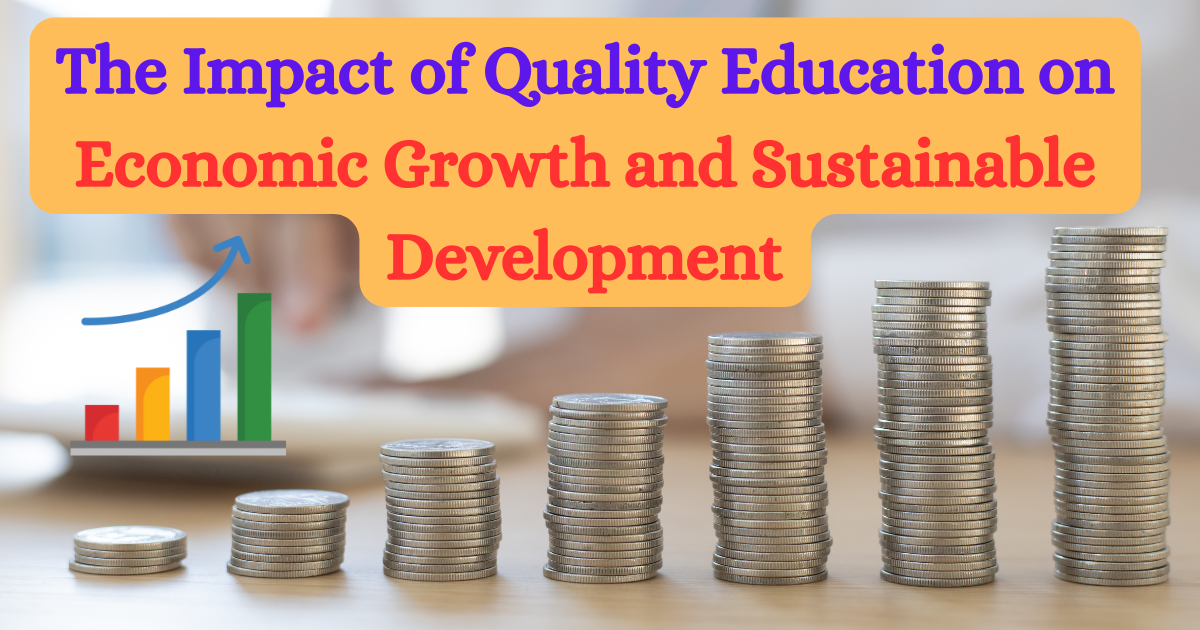The Impact of Quality Education on Economic Growth and Sustainable Development: Education is the foundation of any functioning society: it prepares people to live cohesively in a community, participate politically, and contribute economically. Globally, investments in education underpin social cohesion, economic growth, competitiveness, and innovation.
The Impact of Quality Education on Economic Growth and Sustainable Development
The United Nations ratified its Sustainable Development Goals in 2015. The 17 goals set out the range of objectives for world development. The only way to have economic growth in the long run is to improve the quality of schools.

There is a growing movement to enhance the basic education of the population, fuelled by the belief that everyone has the right to education. Countries are increasingly prioritising the development of education systems that can equip individuals with the skills needed in emerging industries.
In the business realm, the intelligent ability of a student is considered an asset. The more skilled and knowledgeable employees a firm employs, the greater its production potential.
According to the 2019 Shill India Report, a significant % of Indian graduates were employable. However, there existed a wide gap between industry requirements and the education system, in contrast with the previous education policy, which did not put a lot of emphasis on skill building.
How does quality education affect economic growth?
A more educated society contributes to higher rates of economic growth and thus enables the government to lessen poverty. Higher education is a very important sector for the growth and development of human resources, which in turn leads to the social, economic, and scientific development of the country.
Scholing and Growth
While developing countries substantially expanded access to schooling, many did not secure the hoped-for improvements in economic well-being. The simple explanation for this is insufficient emphasis or appreciation for the importance of learning outcomes or cognitive skills.
How does quality education help in sustainable development?
Education for sustainable development is essential as it enables people to understand and respond to the subtle involvements that exist between the environmental, social, and economic systems. And it is important to promote a sense of unity across the globe.
The complex modern world issues brought by environmental deterioration and unstable economic conditions can be tackled only through education. Science education for sustainable development is essential for transforming attitudes and raising consciousness of the information and abilities they need to understand the importance of embracing sustainable behaviors.
The role of education in sustainable development?
1. Promotes Critical Thinking
To understand the role of the sustainable development, difficult issues must be solved creatively
2. Promoting Ethical Values
Education fosters moral principles and a sense of obligation to the environment and other people.
3. Empowering Action
People with education can take significant action because they have the information and abilities to do so.
4. Driving Innovation And Research
Scientific research and development are fueled by education. Education is vital in advancing sustainable technologies.
5. Developing Fortitude
Communities that we get an education from are better able to adjust to the changing conditions of the student and tackle the student’s problems.
6. Support policy Development
The education gives people the necessary information and news to participate in thoughtful debates and influence legislative decisions prioritizing social welfare and environmental preservation.
Conclusion
In this article we discussed the impact of quality education on economic growth and sustainable development: Education is the foundation of any functioning society: it prepares people to live cohesively in a community, participate politically, and contribute economically. While developing countries substantially expanded access to schooling, many did not secure the hoped-for improvements in economic well-being. A more educated society contributes to higher rates of economic growth.